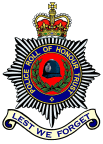I have to admit I've had cause to reflect on blogging after reading that one of my fellow police officers described my last post as being one from a 'brave' police officer who is prepared to carry on 'causing trouble with this police blogging lark.' I'm not brave, I've never intended to cause trouble, and this isn't a lark for me. I'm a coward who hides behind anonymity, I am not responsible for the 'trouble' police bloggers cause - the government is - and I take all of this very seriously. If we didn't write about what irks us, the public would think that we are indeed agents of that government, and not servants to the public.
I want to stress at this point that I haven't taken offence by Area Trace No Search's comment, not a bit of it. He writes a great blog and I sincerely hope he continues to do so. What's more, I hope that my last post doesn't lead that fine officer to cease blogging because he's concerned that my declaration of support for the Libertarian Party is unbecoming of a police officer and would therefore lead other unscrupulous journalists to 'out' us. However, I have to say that upon reading the Libertarian manifesto, I finally found a party that reflects my deep-founded political beliefs. In particular, their views on policing. Here is an excerpt from their manifesto on policing:
- The basic mission for which the police exist is to prevent crime and disorder.
- The ability of the police to perform their duties is dependent upon the public approval of police actions.
- Police must secure the willing co-operation of the public in voluntary observation of the law to be able to secure and maintain the respect of the public.
- The degree of co-operation of the public that can be secured diminishes proportionately to the necessity of the use of physical force.
- Police seek and preserve public favour not by catering to public opinion, but by constantly demonstrating absolute impartial service to the law.
- Police use physical force to the extent necessary to secure observance of the law or to restore order only when the exercise of persuasion, advice, and warning is found to be insufficient.
- Police, at all times, should maintain a relationship with the public that gives reality to the historic tradition that the police are the public and the public are the police; the police being only members of the public who are paid to give full-time attention to duties which are incumbent upon every citizen in the interests of community welfare and existence.
- Police should always direct their action strictly towards their functions, and never appear to usurp the powers of the judiciary.
- The test of police efficiency is the absence of crime and disorder, not the visible evidence of police action in dealing with it.
On a different but related note, I read an excellent post from Hog Day Afternoon today. Not just for the fact that it was so well written, but for one sentence. It was his desire to get home to Mrs H. I don't know why this hit a chord with me, but it did. So, I am to take a brief respite from blogging, only for a few days, to spend some time with Mrs Hobbes and Baby Hobbes, even though my wife is quick to expose my faults.
Anyway, I hope this encourages Area Trace No Search to continue blogging, he would be a sad loss to the community. Until I return, I'd appreciate your thoughts on this and my previous posts. I've messed around with the settings on my blog, and if anyone cares to comment on previous posts I should get an e-mail alerting me, so I promise I shall respond.
In the meantime, please don't forget to show your support on Armed Forces Day this weekend. It's a time to show appreciation for all of those young men and women - past and present - who are prepared to give their lives in order to protect our liberty.
Kind of brings all of the above into perspective, doesn't it?















